Nat Vincent, while not totally unknown to music historians and sheet music collectors, somehow remains only a vague figure in popular music history to most of the public, despite his having no less than five different careers in the field: Popular Music Composer, Vaudevillian, Publisher, Manager, and Cowboy Music Composer. The expanse of his story was recounted by Nat in a 1975 personal oral history, yet even that can't touch on his overall story, and there are still some cryptic elements not totally unearthed. While not all of the mysteries are declassified in this essay, it is hoped it will shed more light on this music man who had at least one substantial hit, and many more that almost made it or are still somewhat familiar.
(Please note that some of the information within was extracted from a March 28-31, 1975 interview by Douglas B. Green in conjunction with the Country Music Hall of Fame, who holds the transcripts of the two sessions in their archives, and who kindly shared it for this essay. For brevity, references to any information from the interview will be referred to by the year, i.e. "in 1975…"
From Missouri to Manhattan
He was born in Kansas City, Missouri, as Nathaniel David Vincent to railroad clerk Nathaniel H. Vincent and Madeline "Mattie" Morgan. While the elder Vincent's middle initial was known to be "H," it is unclear what it stood for.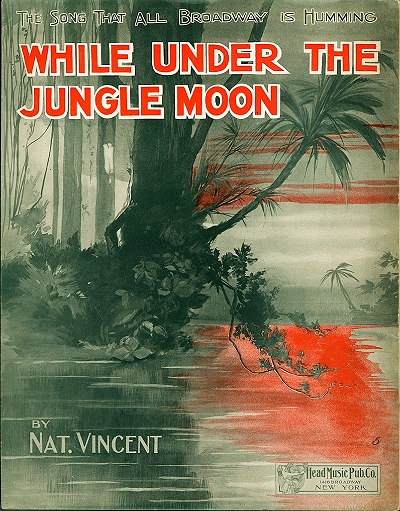 However, it may have been Hawthorne in homage to the famed American novelist Nathaniel Hawthorne (1804-1864). While the younger Nat was shown as Nathaniel David in early documents, as well as his World War II draft, California voter records from 1944 forward, hit 1975 interview, and his California death record, his World War I draft, several copyrights and assorted sources showed him as Nathaniel Hawthorne, or more commonly as Nat H. Vincent, possibly a tribute to his father who died in 1900 when the younger Nat was just ten. His year of birth is also a variable given a wide range of ages shown in assorted census and legal records implying from 1888 to 1896, but given a mid-1895 Kansas census showing him to be 5, and his clear admission of it in the 1975 interview, 1889 is the most likely year. He also had a younger sister, Mary Margaret, born in 1892, but she was only reliably located in one record, the 1900 enumeration. Nat did have a couple of stories about her in his reminisces. His ancestry going back to his paternal great grandparents included Scottish influences, but somewhere on his mother's side was some Native American blood, which gave him a somewhat ruddy complexion.
However, it may have been Hawthorne in homage to the famed American novelist Nathaniel Hawthorne (1804-1864). While the younger Nat was shown as Nathaniel David in early documents, as well as his World War II draft, California voter records from 1944 forward, hit 1975 interview, and his California death record, his World War I draft, several copyrights and assorted sources showed him as Nathaniel Hawthorne, or more commonly as Nat H. Vincent, possibly a tribute to his father who died in 1900 when the younger Nat was just ten. His year of birth is also a variable given a wide range of ages shown in assorted census and legal records implying from 1888 to 1896, but given a mid-1895 Kansas census showing him to be 5, and his clear admission of it in the 1975 interview, 1889 is the most likely year. He also had a younger sister, Mary Margaret, born in 1892, but she was only reliably located in one record, the 1900 enumeration. Nat did have a couple of stories about her in his reminisces. His ancestry going back to his paternal great grandparents included Scottish influences, but somewhere on his mother's side was some Native American blood, which gave him a somewhat ruddy complexion.
 However, it may have been Hawthorne in homage to the famed American novelist Nathaniel Hawthorne (1804-1864). While the younger Nat was shown as Nathaniel David in early documents, as well as his World War II draft, California voter records from 1944 forward, hit 1975 interview, and his California death record, his World War I draft, several copyrights and assorted sources showed him as Nathaniel Hawthorne, or more commonly as Nat H. Vincent, possibly a tribute to his father who died in 1900 when the younger Nat was just ten. His year of birth is also a variable given a wide range of ages shown in assorted census and legal records implying from 1888 to 1896, but given a mid-1895 Kansas census showing him to be 5, and his clear admission of it in the 1975 interview, 1889 is the most likely year. He also had a younger sister, Mary Margaret, born in 1892, but she was only reliably located in one record, the 1900 enumeration. Nat did have a couple of stories about her in his reminisces. His ancestry going back to his paternal great grandparents included Scottish influences, but somewhere on his mother's side was some Native American blood, which gave him a somewhat ruddy complexion.
However, it may have been Hawthorne in homage to the famed American novelist Nathaniel Hawthorne (1804-1864). While the younger Nat was shown as Nathaniel David in early documents, as well as his World War II draft, California voter records from 1944 forward, hit 1975 interview, and his California death record, his World War I draft, several copyrights and assorted sources showed him as Nathaniel Hawthorne, or more commonly as Nat H. Vincent, possibly a tribute to his father who died in 1900 when the younger Nat was just ten. His year of birth is also a variable given a wide range of ages shown in assorted census and legal records implying from 1888 to 1896, but given a mid-1895 Kansas census showing him to be 5, and his clear admission of it in the 1975 interview, 1889 is the most likely year. He also had a younger sister, Mary Margaret, born in 1892, but she was only reliably located in one record, the 1900 enumeration. Nat did have a couple of stories about her in his reminisces. His ancestry going back to his paternal great grandparents included Scottish influences, but somewhere on his mother's side was some Native American blood, which gave him a somewhat ruddy complexion.It is unclear what the home situation was for Nat in his early years, but it appears his parents divorced in the mid-1890s, as his father was listed as such on his death certificate. He was apparently raised by his paternal grandparents. The 1895 Kansas census had him living with retired court clerk Charles H. and Gertrude Vincent in Kansas City, Kansas, albeit without Madeline or Margaret.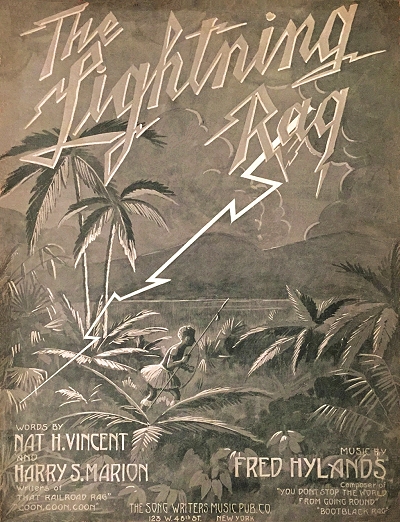 In 1975 He remembered living across the street from Troost Park at Fifteenth Street and Troost Avenue (now covered by the interesction of Interstate 70 and U.S. 71). He was able to hear a variety of band concerts there, including those given by Giuseppe Creatore and John Philip Sousa with Arthur Pryor. He was tapped by a vendor to sell popcorn at some of these events in his youth, and claims he even went on to the bandstand to sell a bag to Sousa, an incident the master later recalled in 1922 at an ASCAP meeting. After the concerts Nat would go home and imitate the music he had heard on a comb with wax paper (a poor man's kazoo).
In 1975 He remembered living across the street from Troost Park at Fifteenth Street and Troost Avenue (now covered by the interesction of Interstate 70 and U.S. 71). He was able to hear a variety of band concerts there, including those given by Giuseppe Creatore and John Philip Sousa with Arthur Pryor. He was tapped by a vendor to sell popcorn at some of these events in his youth, and claims he even went on to the bandstand to sell a bag to Sousa, an incident the master later recalled in 1922 at an ASCAP meeting. After the concerts Nat would go home and imitate the music he had heard on a comb with wax paper (a poor man's kazoo).
 In 1975 He remembered living across the street from Troost Park at Fifteenth Street and Troost Avenue (now covered by the interesction of Interstate 70 and U.S. 71). He was able to hear a variety of band concerts there, including those given by Giuseppe Creatore and John Philip Sousa with Arthur Pryor. He was tapped by a vendor to sell popcorn at some of these events in his youth, and claims he even went on to the bandstand to sell a bag to Sousa, an incident the master later recalled in 1922 at an ASCAP meeting. After the concerts Nat would go home and imitate the music he had heard on a comb with wax paper (a poor man's kazoo).
In 1975 He remembered living across the street from Troost Park at Fifteenth Street and Troost Avenue (now covered by the interesction of Interstate 70 and U.S. 71). He was able to hear a variety of band concerts there, including those given by Giuseppe Creatore and John Philip Sousa with Arthur Pryor. He was tapped by a vendor to sell popcorn at some of these events in his youth, and claims he even went on to the bandstand to sell a bag to Sousa, an incident the master later recalled in 1922 at an ASCAP meeting. After the concerts Nat would go home and imitate the music he had heard on a comb with wax paper (a poor man's kazoo).The 1900 census, taken soon after the elder Nathaniel's death (3/10/1900), found him residing with just their grandmother in Chillicothe, Missouri. Going back to this time, Nat claimed he had never taken a piano lesson in this life, or even trained in poetry or music notation. They were all accumulated skills that he learned in order to make something out of his growing musical interests. In 1975 he noted that around 1902 to 1903, his mother was a pianist for the Daughters of the Revoution [DAR] as well as a secretary for the organization. She had a Chickering grand [whether it was in her home or their building was unclear], and when she wasn't playing it, he would be "upt there thumping on it." He also wrote a few songs in his pre-teen years, many of them parodies with supposedly clever lyrics. According to his ASCAP biography, Nat was reportedly sent to the Betts Military Academy in Stamford, Connecticut, in his teens, which does not account for his musical education, something that was evidently completed separately during his years in Missouri. This entry is questionable in its content.
Nat later noted that around 1906 he had moved to Brooklyn, New York, to live with an affluent uncle and get a better education than he might have in Missouri. It appears that he spent the summer of 1907 coaching a little league baseball team, as a Nat H. Vincent of Flatbush was mentioned in this capacity in the papers over a period of three months. This same player, as "Happy" Nat Vincent, was also a collegiate pitcher in 1907 and 1908, giving some credence to this probability, in addition to no further mentions of these activities after that period and his later participation in vaudeville baseball teams.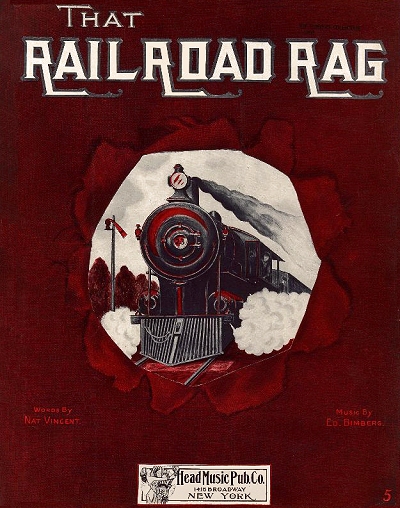 Nat was also a noted pool sharp while still in high school, according to a few notices in the Brooklyn Eagle in 1907 and 1908. It was during this time that he wrote his first songs at the urging of the school principal who had heard his clever lyrics parodying a couple of teachers in the high school. He also wrote some for a school minstrel show. By late 1908 Nat was working for a florist across the East River in the theater district of Manhattan. Within a year he had entered the field of music as an accompanist and sheet music demonstrator.
Nat was also a noted pool sharp while still in high school, according to a few notices in the Brooklyn Eagle in 1907 and 1908. It was during this time that he wrote his first songs at the urging of the school principal who had heard his clever lyrics parodying a couple of teachers in the high school. He also wrote some for a school minstrel show. By late 1908 Nat was working for a florist across the East River in the theater district of Manhattan. Within a year he had entered the field of music as an accompanist and sheet music demonstrator.
 Nat was also a noted pool sharp while still in high school, according to a few notices in the Brooklyn Eagle in 1907 and 1908. It was during this time that he wrote his first songs at the urging of the school principal who had heard his clever lyrics parodying a couple of teachers in the high school. He also wrote some for a school minstrel show. By late 1908 Nat was working for a florist across the East River in the theater district of Manhattan. Within a year he had entered the field of music as an accompanist and sheet music demonstrator.
Nat was also a noted pool sharp while still in high school, according to a few notices in the Brooklyn Eagle in 1907 and 1908. It was during this time that he wrote his first songs at the urging of the school principal who had heard his clever lyrics parodying a couple of teachers in the high school. He also wrote some for a school minstrel show. By late 1908 Nat was working for a florist across the East River in the theater district of Manhattan. Within a year he had entered the field of music as an accompanist and sheet music demonstrator.The 1910 Federal census showed Nat living across the East River in Manhattan at Hotel Times Square, listed as a song writer and publisher. Pushing one of the songs he had written for the school show, While Under the Jungle Moon, he had some assistance from a Mr. Doyle, who had shown it to publisher Harry Von Tilzer, who passed on it, but recommended the Head Music Publishing Company. While the tune brought him only a little attention, he was at least established in the world of Tin Pan Alley. It would be more than a year for song plugging and working as accompanist before Nat would see a glimmer of success. He was married on June 11, 1911, to 19-year-old Eleanor M. White, and two months later at age 22 he set out to conquer the publishing world. In an announcement in the entertainment-centric New York Clipper of August 26, 1911, it was said that:
The Metropolitan Music Pub. Co., with extensive office in the New York Theatre Building, opened their doors to the profession on Aug. 1. Nat H. Vincent, a well known author and composer, is manager of the professional department, and reports that the company is enjoying big business… Mr. Vincent states that the performers who are fastidious in their tastes will find songs that will meet with their every requirements [sic], and feels confident that in the catalogue placed in his hands that they are not only novelties, but of the catchy, tuneful, popular song hit variety.
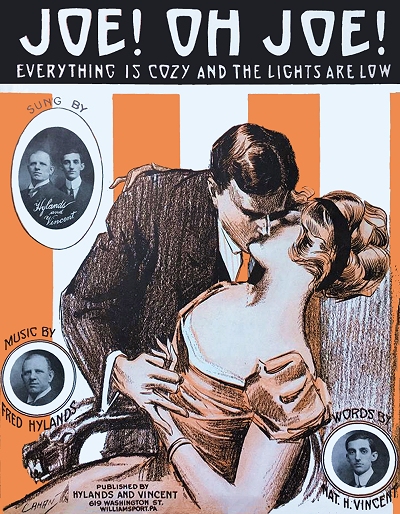 Around the same time, Nat teamed with composer Edward Bimberg for a trio of pieces, the most popular of them being That Railroad Rag of 1911, all issued by Head Music, who had signed Nat to their staff in 1910. This and a couple of other pieces, as well as his piano work, appear to have brought him to the attention of recording and vaudeville pianist Fred Hylands. No longer working for Metropolitan, Nat and Fred teamed up in 1912 for a short-lived vaudeville act. They had three works published, apparently vanity presses that were facilitated by Harry Lincoln and Vandersloot Music in Williamsport, Pennsylvania. Hylands would die the following year, partially as a result of his obesity, but Nat had moved on by that time. In fact, in his later rembrances, Hylands name was never brought up, so it may have been a challenging relationship. In 1975 Nat made the suspicious claim that in 1911 or 1912, Irving Berlin had offered him "$20,000" to "lose his identity" (ghost write Berlin songs). He said he was already making $33,000 and has his identity intact, after which Berlin simply walked out of the room. While virtually nothing came from his pen in 1913 and most of 1914, his story was continued in a professional profile found in The Billboard of February 9, 1913:
Around the same time, Nat teamed with composer Edward Bimberg for a trio of pieces, the most popular of them being That Railroad Rag of 1911, all issued by Head Music, who had signed Nat to their staff in 1910. This and a couple of other pieces, as well as his piano work, appear to have brought him to the attention of recording and vaudeville pianist Fred Hylands. No longer working for Metropolitan, Nat and Fred teamed up in 1912 for a short-lived vaudeville act. They had three works published, apparently vanity presses that were facilitated by Harry Lincoln and Vandersloot Music in Williamsport, Pennsylvania. Hylands would die the following year, partially as a result of his obesity, but Nat had moved on by that time. In fact, in his later rembrances, Hylands name was never brought up, so it may have been a challenging relationship. In 1975 Nat made the suspicious claim that in 1911 or 1912, Irving Berlin had offered him "$20,000" to "lose his identity" (ghost write Berlin songs). He said he was already making $33,000 and has his identity intact, after which Berlin simply walked out of the room. While virtually nothing came from his pen in 1913 and most of 1914, his story was continued in a professional profile found in The Billboard of February 9, 1913:Nat H. Vincent, professional manager for the Theodore Morse Music Company… is a young man who can do many things—and do them "right." New York has been his stamping ground for so many years that the many theaters, cafes and cabarets are as well known to him as the express stops to a subway guard. Deeply interested in the music game since early youth, he has identified himself with all that an ideal professional manager should know. As a lyric writer, he gave the world Railroad Rag, while in the employ of the Head Music Publishing Company, when that concern was at its height, and many other good sellers, some of which bore his name, for both lyrics and music. He has a good demonstrating voice and possesses the additional ability of accompanying himself upon the piano. Within the first two weeks of his association with the Theodore Morse Company the calibre of the acts recruited bore evidence to the fact that "Vince was on the job," (as his subordinates termed it). Nat has a pleasant, inviting personality and knows how to keep tab upon the work of his "boosters," without appearing to be doing so. The peculiar combination of Scotch-Irish and American Indian blood flowing in his veins has provided him with the Scottish love of music. The Irish command of humor (lyrically and in conversation), and the healthy appearance of a full-fledged "Indian."
Not long after this, in July of 1913, Nat left Morse, reportedly on good terms, and migrated to the Broadway Music Company run by Will Von Tilzer, whose brother Harry Von Tilzer also headed a large music publishing company. Initially put in charge of overseeing Will Von Tilzer's expansion into Chicago, Illinois, in August, Nat was back in New York City before the autumn.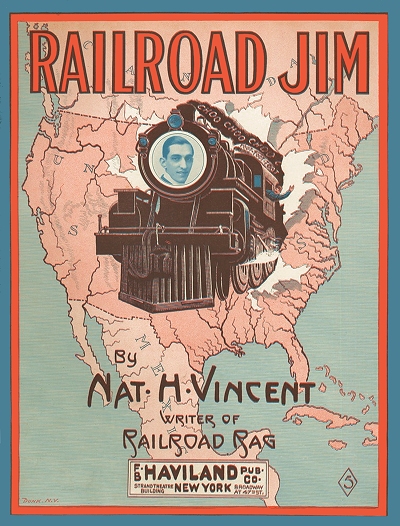 The move to Broadway Music only helped to continue his dearth of compositions. He was also part of a large men's chorus made up of Tin Pan Alley professionals, dubbed "The Knights of Harmony," he performed for large publisher functions and the occasional concert. One notice in the New York Clipper that December touted Nat as "Always Busy," hanging around the theaters or schilling his publisher's songs to performers throughout New York City. In fact, one reporter with the Clipper put in a notice lamenting that while Nat was working at the Chicago office of Broadway that summer, he had become too busy to write back to his friends, and that they would like "just a line" now and then. Another notice predicted his acuity at smelling a hit, stating that "Nat thinks that 'You Made Me Love You' is the greatest song ever written, and is telling hundreds of his friends that they can't do without it."
The move to Broadway Music only helped to continue his dearth of compositions. He was also part of a large men's chorus made up of Tin Pan Alley professionals, dubbed "The Knights of Harmony," he performed for large publisher functions and the occasional concert. One notice in the New York Clipper that December touted Nat as "Always Busy," hanging around the theaters or schilling his publisher's songs to performers throughout New York City. In fact, one reporter with the Clipper put in a notice lamenting that while Nat was working at the Chicago office of Broadway that summer, he had become too busy to write back to his friends, and that they would like "just a line" now and then. Another notice predicted his acuity at smelling a hit, stating that "Nat thinks that 'You Made Me Love You' is the greatest song ever written, and is telling hundreds of his friends that they can't do without it."
 The move to Broadway Music only helped to continue his dearth of compositions. He was also part of a large men's chorus made up of Tin Pan Alley professionals, dubbed "The Knights of Harmony," he performed for large publisher functions and the occasional concert. One notice in the New York Clipper that December touted Nat as "Always Busy," hanging around the theaters or schilling his publisher's songs to performers throughout New York City. In fact, one reporter with the Clipper put in a notice lamenting that while Nat was working at the Chicago office of Broadway that summer, he had become too busy to write back to his friends, and that they would like "just a line" now and then. Another notice predicted his acuity at smelling a hit, stating that "Nat thinks that 'You Made Me Love You' is the greatest song ever written, and is telling hundreds of his friends that they can't do without it."
The move to Broadway Music only helped to continue his dearth of compositions. He was also part of a large men's chorus made up of Tin Pan Alley professionals, dubbed "The Knights of Harmony," he performed for large publisher functions and the occasional concert. One notice in the New York Clipper that December touted Nat as "Always Busy," hanging around the theaters or schilling his publisher's songs to performers throughout New York City. In fact, one reporter with the Clipper put in a notice lamenting that while Nat was working at the Chicago office of Broadway that summer, he had become too busy to write back to his friends, and that they would like "just a line" now and then. Another notice predicted his acuity at smelling a hit, stating that "Nat thinks that 'You Made Me Love You' is the greatest song ever written, and is telling hundreds of his friends that they can't do without it."Actually, according to his 1975 remembrance, Nat was involved with the efforts of composers Joe McCarthy and James V. "Jimmie" Monaco in finding the right performance cadence and style for the piece as they shopped it around to New York singers. Harry Von Tilzer had initially been shopped with the song, but given the way it was performed, almost as a one-step, showed little interest. His plugger, Nemo Roth, was a friend of the composers and initially tried to get it placed in New York. Nat finally convined them to alter the melody, which had a range of "almost two octaves. I said, 'Well, this would be a terrific song, only you have to cut it down for people like Sophie Tucker or any of those with no big voices.' In other words, they weren't an educated musician." Roth managed to have it substituted one evening at a dance event. The singer, who was reading on the spot, was a bit inebriated and had to perform it more slowly by necessity, which brought out the true essence of the piece. When Will Von Tilzer sent Nat to Chicago, he managed to get the song placed on stage there with a singer at the State Theater. Then, for whatever reason, the Chicago mayor, who would have been Carter Harrison, Jr. at that time, did not care for the tone of the song, and evidently tried to have it banned from the theaters in town. It was a bit too late, as You Made Me Love You had now been heard and was catching on. Kresges and Woolworths kept selling out of copies thanks to Nat's endless effort to schill the piece, and it soon made it back to New York. In the end, it took only one particular friend, Al Jolson, performing it at the Winter Garden Theater, to prove Nat's instinct to be accurate.
Song Pusher or Song Writer?
Nat remained with Von Tilzer for well over a year, finally departing the company in late October of 1914. His next step was to get back into vaudeville as a performer. His new partner was John "Jack" Galvin, whom he had worked with for some time at Broadway Music, and they started hitting the vaudeville houses and burlesques in November. However, he also wanted to do more as a composer, and with Galvin decided to join the staff of the recently formed Koch Music Company. The two of them submitted a couple of their tunes to their new employer in December. The New York Clipper of January 2, 1915, simply forwarding the usual hyperbolic notice promoting a publisher or composer, noted that:
Johnnie Galvin and Nat Vincent, two of the most popular boys from the advance school of music boosters, deserve all the success they are now having, and the results they have attained throughout their careers in the music game must be attributed to earnest and conscientious work in the interest of the "firm" at all times. They both started at the bottom of the ladder as pluggers and demonstrators, but in both cases, their ability asserted itself and they are now at the head of the list of popular writers, and feel a keen sense of gratification in the fact that their professional friends have come to the front and are putting over their two big New Year's hit: "Minstrels on Parade" and "Sly Old Moon Man." The boys are under contract to the latest important addition to the B'way Music Publishers, Geo. J. Koch…
The team and their publisher made a bit of news that January when they offered up My Pretty American Girl to four acts only in New York City, asking them each to pay $100 to restrict the piece only to them for a period of four weeks,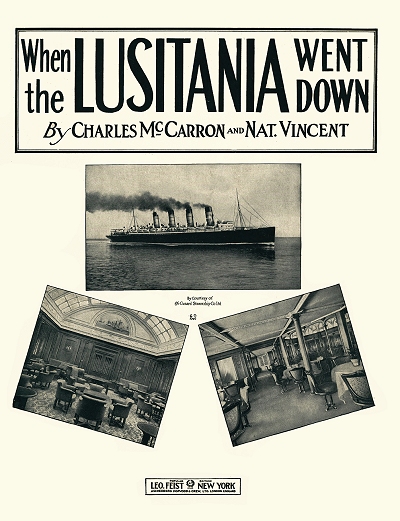 giving them exclusive rights to the initial performances, which was actually desirable at that time when certain artists felt like they "owned" a particular tune. This was opposite of the idea of early "payola" in which the publishers, and later record companies, offered up funds to have their product put before the public, and though a bold move, it never quite caught on. Neither did the piece, which was only a moderate hit overall. A planned world tour for 1915 also ended up not materializing, most likely as a result of the ongoing war in Europe. The 1915 New York State census confirmed that Nat was staying at home with Eleanor, now working as a song writer rather than a song pusher.
giving them exclusive rights to the initial performances, which was actually desirable at that time when certain artists felt like they "owned" a particular tune. This was opposite of the idea of early "payola" in which the publishers, and later record companies, offered up funds to have their product put before the public, and though a bold move, it never quite caught on. Neither did the piece, which was only a moderate hit overall. A planned world tour for 1915 also ended up not materializing, most likely as a result of the ongoing war in Europe. The 1915 New York State census confirmed that Nat was staying at home with Eleanor, now working as a song writer rather than a song pusher.
 giving them exclusive rights to the initial performances, which was actually desirable at that time when certain artists felt like they "owned" a particular tune. This was opposite of the idea of early "payola" in which the publishers, and later record companies, offered up funds to have their product put before the public, and though a bold move, it never quite caught on. Neither did the piece, which was only a moderate hit overall. A planned world tour for 1915 also ended up not materializing, most likely as a result of the ongoing war in Europe. The 1915 New York State census confirmed that Nat was staying at home with Eleanor, now working as a song writer rather than a song pusher.
giving them exclusive rights to the initial performances, which was actually desirable at that time when certain artists felt like they "owned" a particular tune. This was opposite of the idea of early "payola" in which the publishers, and later record companies, offered up funds to have their product put before the public, and though a bold move, it never quite caught on. Neither did the piece, which was only a moderate hit overall. A planned world tour for 1915 also ended up not materializing, most likely as a result of the ongoing war in Europe. The 1915 New York State census confirmed that Nat was staying at home with Eleanor, now working as a song writer rather than a song pusher.After limited success with Galvin, Vincent teamed up with Billy Tracey, and during the summer of 1915 they toured outside of New York City into greater New England, doing a few performances in the city after their road trip. However, it was as a songwriter, both of lyrics and music for which the choice of partner would determine, that Nat started to gain ground. Among his hits that year were Dancing the Jelly Roll, one of a few written with Herman Paley, and When the Lusitania Went Down based on that horrific tragedy, one of a few with Charles McCarron. In 1975 Nat claimed they wrote the piece in the morning and afternoon after the news broke, signed a contract on it with publisher Leo Feist around five o'clock the same day, and having it in print within two or three days. Woolworth's reportedly bought over 55,000 copies the day it came out, and Nat said it was the quickest publication of any song he had ever known. He was next responsible for the resurrection of a character who had already been killed off in song, When Old Bill Bailey Plays the Ukalele [sic but intentionally so for lyrical reasons], which was also composed with McCarron specifically for singer Blossom Seeley. Some of his pieces were even published by his old boss Will Von Tilzer, proving that "Smiling Nat" as he was often called was truly the object of good will in the industry.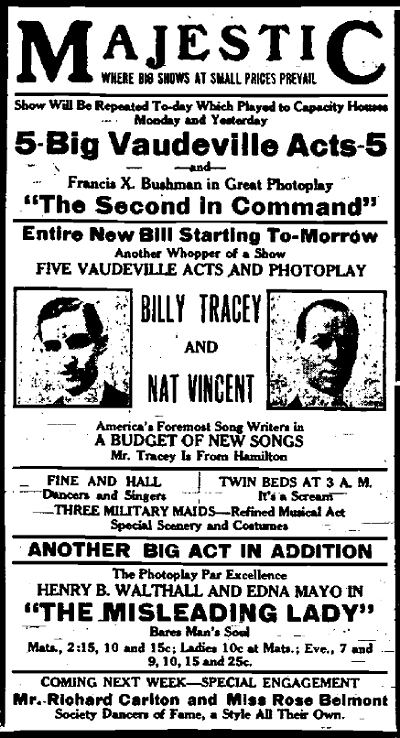 To top this off, he was a member in high standing of the of the Popular Song Writer's Association.
To top this off, he was a member in high standing of the of the Popular Song Writer's Association.
 To top this off, he was a member in high standing of the of the Popular Song Writer's Association.
To top this off, he was a member in high standing of the of the Popular Song Writer's Association.Nat forged forward into 1916 and 1917 balancing his duties as a songwriter and promoter with performances by Vincent and Tracey throughout New York and New England, including a few runs at the Majestic in Utica, New York. His name was seen frequently in both vaudeville listings and new song advertisements for a wide variety of publishers from Tin Pan Alley, focused during 1916 and 1917 largely on Shapiro, Bernstein & Company. Among the minor hits of this period were Give a Little Credit to Your Dad, Some Night, Sailing Around and Oh! Papa. However, when asked about a song for the Greenwich Village Follies for 1916, he came up with Naughty! Naughty! Naughty!. The idea behind songs like this were to get all of the showgirls on stage and onto the center runway of the Winter Garden Theater. This was considered to be "bald-headed row," where the older bald men would sit to try a get a peek up the showgirls' skirts, and maybe even earn a kiss on their shiny top. As with many others, Nat claims that he wrote the piece, and that Tracey and Joe Goodwin add their names added to it simply because they got it placed in the show. Amidst the predictable Sigmund Romberg score, it was reportedly a hit in the short term.
Many of Nat's works were making their way to cylinders, discs and piano rolls as well. His focus changed a bit as the United States entered the conflict in England and Europe, and touring was reduced, while many entertainers were recruited for bond rallies, including Nat. It is possible that Tracey was drafted, as Nat was advertised doing several solo "pianologue" gigs in late 1917 into 1918. He also went back to semi-regular employment, taking a position with Shapiro, Bernstein in mid-1917. This position was confirmed on his draft record from June, in which he claimed deferment based on being the sole support for his wife and mother. However, he still did some work for the Navy, providing morale concerts for the sailors. During this time, he composed Who Was the Father of the Children Who Lived with the Woman Who Lived in the Shoe? for German-centric comedian Sam Bernard who ended up using it, ironically, in Irving Berlin's Music Box Revue. Berlin wanted the piece for his catalog, but was thwarted by Nat once again, he gave it to Shapiro, Bernstein & Company. Still free-lancing for the remainder of the year, in early 1918 he became part of that publisher's regular staff. Around that same time, he teamed with Lew Pollack, composer of That's a Plenty, for a brief run as a duo. They wrote a couple of tunes together, including At the Jazz Town Novelty Ball.
As early as 1916, Nat had composed with lyricist James Kendis. While there was nothing of any great consequence at that time, they created a connection. In 1918, adding lyricist James Brockman into the mix, the three started turning out a string of passable hits, including some war-time efforts and novelty songs. By the autumn of that year, Kendis and Brockman decided to form their own publishing company, and then brought on Nat as their professional manager. While songs like Everybody's Happy Now and Way Down South in Dixie Where It's Peach-Jam Makin' Time got some traction, it was one song in particular that actually was the genesis of their company, and it made a lasting reputation for the boys, even though they weren't originally credited on the cover.
The Bubble and The Bursts
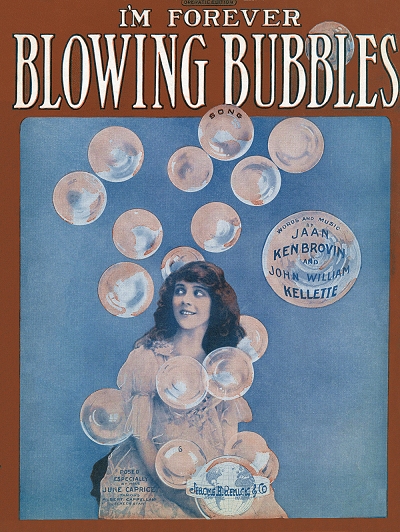 The melody and idea for the song came from John William Kellette, but the credit for the success of the little waltz tune should go to Vincent, Kendis and Brockman. A seemingly silly but catchy tune, I'm Forever Blowing Bubbles became a steadfast hit before 1918 was out. According to Nat in a 1929 interview, All four composers were more or less obligated to other publishers at that time, so they found it difficult to choose one to turn the song in to without offending the others. Kendis and Brockman, believing in their Bubbles tune, formed their company. In order to mask their identities, they combined letters from their collective first names to create Jaan, and three letters from each of their last names to construct Ken-Bro-Vin, resulting in "Jaan Kenbrovin" as the lyricist for the tune. Then they got it placed in The Passing Show of 1918, introduced on stage by singer Helen Carrington. Kellette later claimed that Kendis wrote one line of the chorus, and that Vincent changed one word, both contentions eventually challenged in the press. Regardless of who did what, it instantly caught on, and many artists were clamoring to perform and even record the charming and memorable tune. It was also sought out by other publishers, and the trio ended up selling it off to Jerome H. Remick by mid-1919. It was also used in parody form by writer Ring Lardner during the notorious Black Sox scandal that came out of the 1919 World Series, in which he wrote I'm Forever Blowing Ballgames. The fame for this song spread overseas as well. Even a century later it can be heard in numerous sources, including cartoons, movies, and even soccer games in England, being an official song of the West Ham United in London. Overall, it left the composers very well off, and they weren't just blowing bubbles by the end of the decade.
The melody and idea for the song came from John William Kellette, but the credit for the success of the little waltz tune should go to Vincent, Kendis and Brockman. A seemingly silly but catchy tune, I'm Forever Blowing Bubbles became a steadfast hit before 1918 was out. According to Nat in a 1929 interview, All four composers were more or less obligated to other publishers at that time, so they found it difficult to choose one to turn the song in to without offending the others. Kendis and Brockman, believing in their Bubbles tune, formed their company. In order to mask their identities, they combined letters from their collective first names to create Jaan, and three letters from each of their last names to construct Ken-Bro-Vin, resulting in "Jaan Kenbrovin" as the lyricist for the tune. Then they got it placed in The Passing Show of 1918, introduced on stage by singer Helen Carrington. Kellette later claimed that Kendis wrote one line of the chorus, and that Vincent changed one word, both contentions eventually challenged in the press. Regardless of who did what, it instantly caught on, and many artists were clamoring to perform and even record the charming and memorable tune. It was also sought out by other publishers, and the trio ended up selling it off to Jerome H. Remick by mid-1919. It was also used in parody form by writer Ring Lardner during the notorious Black Sox scandal that came out of the 1919 World Series, in which he wrote I'm Forever Blowing Ballgames. The fame for this song spread overseas as well. Even a century later it can be heard in numerous sources, including cartoons, movies, and even soccer games in England, being an official song of the West Ham United in London. Overall, it left the composers very well off, and they weren't just blowing bubbles by the end of the decade.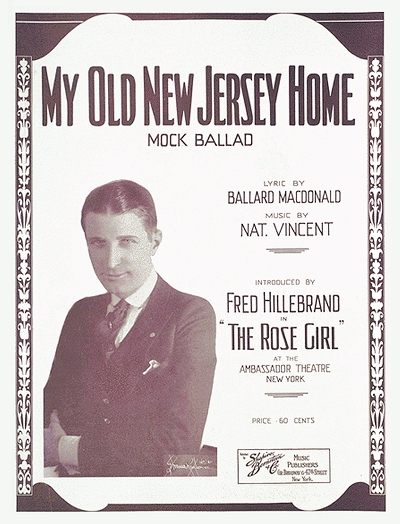 In late 1918 following the end of the war, Nat struck out on his own on stage, doing a solo vaudeville act comprised largely of his material. According to a review in the New York Clipper of March 5, 1919, "He has a clear voice, a pleasing personality and the advantage of being able to sing his own songs." The reviewer also criticized Vincent for not emphasizing often enough that he was singing his own material. "The material in the offering is well arranged, nicely delivered and combined with Vincent's fine bearing make up a good singing act." Given that his involvement with Bubbles was one of the worst-kept secrets in Tin Pan Alley, Nat's talents were sought after once again, largely to add prestige to the roster. One of those was Gilbert and Friedland, who issued several compositions with Nat's named attached throughout early-to-mid 1919. Ultimately, however, it was Jack Mills, who had recently begun what would turn into a very successful publishing enterprise, who signed Nat up for a "term of years to publish all his compositions." It was also noted in that same announcement in the July 23, 1919 issue of the New York Clipper that "Miss Blanche Franklyn, a Los Angeles writer, has also signed with the Mills Company." In May, another notice in The Billboard stated that "Nat Vincent… and his fair assistant in attendance, Miss Belle Brooks, are an exceptionally busy young couple these days at the executive offices and rehearsal rooms of Gilbert & Friedland." Spending more time at the office and on the boards meant less time composing, so Nat's output for 1919 was rather sparse. Evidently, so was his presence at home. There may have been more to Nat's association with Miss Brooks and Miss Franklin than their mutual employers. Nat and Blanche, who was advertised as his assistant at Mills, would not only form a new vaudeville act by the end of 1919, but cowrite a string of songs as well. However, those three were evidently not the only ones, something that did not sit well with Eleanor. According to The New York Clipper of November 12, 1919:
In late 1918 following the end of the war, Nat struck out on his own on stage, doing a solo vaudeville act comprised largely of his material. According to a review in the New York Clipper of March 5, 1919, "He has a clear voice, a pleasing personality and the advantage of being able to sing his own songs." The reviewer also criticized Vincent for not emphasizing often enough that he was singing his own material. "The material in the offering is well arranged, nicely delivered and combined with Vincent's fine bearing make up a good singing act." Given that his involvement with Bubbles was one of the worst-kept secrets in Tin Pan Alley, Nat's talents were sought after once again, largely to add prestige to the roster. One of those was Gilbert and Friedland, who issued several compositions with Nat's named attached throughout early-to-mid 1919. Ultimately, however, it was Jack Mills, who had recently begun what would turn into a very successful publishing enterprise, who signed Nat up for a "term of years to publish all his compositions." It was also noted in that same announcement in the July 23, 1919 issue of the New York Clipper that "Miss Blanche Franklyn, a Los Angeles writer, has also signed with the Mills Company." In May, another notice in The Billboard stated that "Nat Vincent… and his fair assistant in attendance, Miss Belle Brooks, are an exceptionally busy young couple these days at the executive offices and rehearsal rooms of Gilbert & Friedland." Spending more time at the office and on the boards meant less time composing, so Nat's output for 1919 was rather sparse. Evidently, so was his presence at home. There may have been more to Nat's association with Miss Brooks and Miss Franklin than their mutual employers. Nat and Blanche, who was advertised as his assistant at Mills, would not only form a new vaudeville act by the end of 1919, but cowrite a string of songs as well. However, those three were evidently not the only ones, something that did not sit well with Eleanor. According to The New York Clipper of November 12, 1919:Nat Vincent was served with papers last week in an action for divorce begun by Eleanor M. Vincent, who charges that he has been prone to forget his marriage vows on several occasions lately when in the company of Babe Francis, particularly on May 5th last at the Richmond Hotel and at other and various places here. In view of this, she wishes to be free from him.
The couple had no children which made the divorce proceedings a bit simpler, likely coming down to the matter of money. The 1920 enumeration taken in January of that year indicated that Nat was now living in a boarding house with other theatrical types and songwriters, showing as married,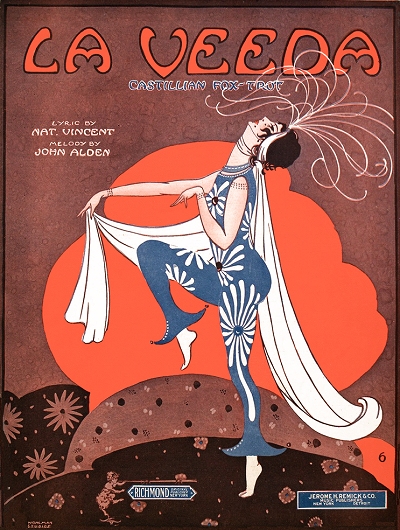 but understandably with Eleanor residing separately with an actress friend a few blocks away. By this time, Babe was a memory and Blanche was his new partner on stage by September of 1919, and perhaps even offstage. Soon after he was signed, Nat became a professional manager for Jack Mills, who issued the debut Vincent and Franklyn number Pretty Little Cinderella at the end of 1919. An advertisement placed by the pair touting their upcoming songs and their act, featured in the New York Clipper on Christmas Eve, further codified the relationship.
but understandably with Eleanor residing separately with an actress friend a few blocks away. By this time, Babe was a memory and Blanche was his new partner on stage by September of 1919, and perhaps even offstage. Soon after he was signed, Nat became a professional manager for Jack Mills, who issued the debut Vincent and Franklyn number Pretty Little Cinderella at the end of 1919. An advertisement placed by the pair touting their upcoming songs and their act, featured in the New York Clipper on Christmas Eve, further codified the relationship.
 but understandably with Eleanor residing separately with an actress friend a few blocks away. By this time, Babe was a memory and Blanche was his new partner on stage by September of 1919, and perhaps even offstage. Soon after he was signed, Nat became a professional manager for Jack Mills, who issued the debut Vincent and Franklyn number Pretty Little Cinderella at the end of 1919. An advertisement placed by the pair touting their upcoming songs and their act, featured in the New York Clipper on Christmas Eve, further codified the relationship.
but understandably with Eleanor residing separately with an actress friend a few blocks away. By this time, Babe was a memory and Blanche was his new partner on stage by September of 1919, and perhaps even offstage. Soon after he was signed, Nat became a professional manager for Jack Mills, who issued the debut Vincent and Franklyn number Pretty Little Cinderella at the end of 1919. An advertisement placed by the pair touting their upcoming songs and their act, featured in the New York Clipper on Christmas Eve, further codified the relationship.In an interesting experiment, Nat and nine other songwriters collaborated on a one-act 30 minute musical presented at the famed Palace vaudeville house in Manhattan in February of 1920. Titled A Trip to Hitland, the artists, including some of Vincent's co-writers, presented several of their "hits" on stage from the piano, all but one of them dressed in tuxedos. While there was likely a clear delineation between who wrote what, the collective names were listed on all of the compositions - at least on the covers and in the program. They all contributed to You're Just Around the Corner from Heaven, added a few months in to the act. While it did not qualify as a Broadway show, it did have some limited success on and off throughout 1920 and into 1921 at various venues around the Midwest and Northeast, but ironically it ultimately yielded no "hits." Nat was often singled out as the one member that had a passable singing voice. Similar revues were seen in the early days of sound films, but this may have been the first of its kind. Among their musical stunts was one where they collectively wrote a new song on stage each night based on audience suggestions. In early April, Bernie Grossman, one of the ten members, had an emergency appendectomy while in Chicago, so they were short a man for a week or more.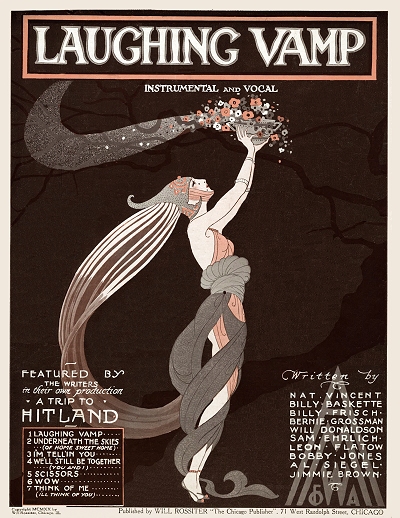 Vincent later publicly thanked the managers of the Keith and Orpheum Circuits for continuing to pay their full salaries during this time, which showed high regard for the performers and professionalism from the organization.
Vincent later publicly thanked the managers of the Keith and Orpheum Circuits for continuing to pay their full salaries during this time, which showed high regard for the performers and professionalism from the organization.
 Vincent later publicly thanked the managers of the Keith and Orpheum Circuits for continuing to pay their full salaries during this time, which showed high regard for the performers and professionalism from the organization.
Vincent later publicly thanked the managers of the Keith and Orpheum Circuits for continuing to pay their full salaries during this time, which showed high regard for the performers and professionalism from the organization.In between performances of Hitland, Nat and Blanche also worked the vaudeville stages a bit, schilling their own material and gaining more notoriety. They wrote a half-hour one-act musical comedy farce titled Last Night which fared only moderately well. Blanche also had a stage act with an accompanist. Nat's divorce came through by the middle of the year, and on August 27, 1920, he and Blanche were married in Atlantic City, New Jersey, at Saint James Episcopal Church, with several of their show business friends in attendance or as attendants. Then they went off to separate careers for the next several months.
Finally, in March of 1921, Blanche and Nat formally announced their touring vaudeville act on the Keith-Albee circuit. As may be expected from the life of a performer doing three-a-days on a coast to coast tour at a theater away from home, songwriting once again took a back seat, with only a handful of tunes from Nat with Blanche and others over the next four years. He also contributed occasional columns to The Vaudeville News, such as "Heard Between Jumps" or "Mid-West Jottings," which included anecdotes and observations about life on the road as a performer. Vincent was clearly a highly vocal and unapologetic advocate for the National Vaudeville Association, likely holding some position in the organization by that time. As for the husband and wife act, the following assessment was made in Variety on June 3, 1921:
… Nat Vincent came next, assisted by Bland [sic?] Franklin [sic] singing, or is it vice versa? Vincent is a writer of popular songs and has not been seen often enough to be the popular writer of popular numbers. His appearance, piano playing and remarks hit the mark. Like most song writers, Vincent has a fair voice, but is a better melody master than a warbler. Miss Franklin [sic] has followed the latest hair dressing styles and shows her ears. She is a heavy set woman, attractive and jolly. Her voice is high-pitched and acceptable. Everything said by the duo is in verse and they pleased the crowd enough to take an encore
Another one from April 8, 1922, in The Billboard, read
The songs sung by Blanche Franklyn and Nat Vincent, and written by the latter, would go much better minus the hokum, also minus the numerous announcements of Miss Franklyn calling to mind before each song was sung that Mr. Vincent was the author. They both appear to have the ability to put a song over and would, no doubt, were it not for the above-mentioned faults.
Despite the lukewarm reviews, the act did well for two seasons. In the middle of 1922, some of the cast of Hitland reshaped the show with six composers and their songs, calling it The Words and Music Makers, which played on and off for several months through the end of the year. Nat was also peripherally involved with the "all-colored" show Bon Bon Buddy, Jr.,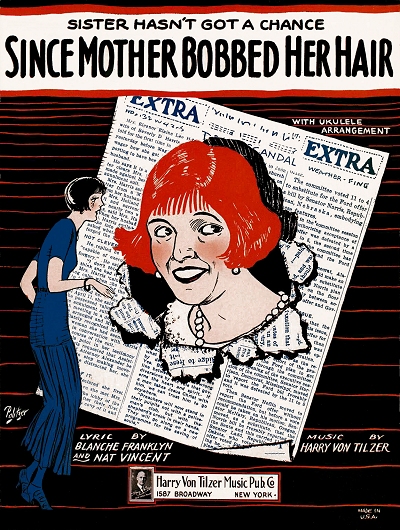 staged by Walter Brooks in September of 1922. Brooks had been successful the prior year with Shuffle Along by Eubie Blake and Noble Sissle. Black composer Maceo Pinkard had written most of the score, with Nat contributing some lyrics here and there, one of his few direct forays into Broadway. This was followed by a reshaping of the same review, this time called Liza, staged in November, also credited to Pinkard and Vincent, and staged by Brooks. It finally found success in 1923 at the Lafayette Theater in New York. In the interim, Nat, who in 1975 claimed he had not been admitted into ASCAP because he reportedly had something against a particular print jobber, was finally brought into that organization in 1922, as they could no longer deny his important status in the songwriting world.
staged by Walter Brooks in September of 1922. Brooks had been successful the prior year with Shuffle Along by Eubie Blake and Noble Sissle. Black composer Maceo Pinkard had written most of the score, with Nat contributing some lyrics here and there, one of his few direct forays into Broadway. This was followed by a reshaping of the same review, this time called Liza, staged in November, also credited to Pinkard and Vincent, and staged by Brooks. It finally found success in 1923 at the Lafayette Theater in New York. In the interim, Nat, who in 1975 claimed he had not been admitted into ASCAP because he reportedly had something against a particular print jobber, was finally brought into that organization in 1922, as they could no longer deny his important status in the songwriting world.
 staged by Walter Brooks in September of 1922. Brooks had been successful the prior year with Shuffle Along by Eubie Blake and Noble Sissle. Black composer Maceo Pinkard had written most of the score, with Nat contributing some lyrics here and there, one of his few direct forays into Broadway. This was followed by a reshaping of the same review, this time called Liza, staged in November, also credited to Pinkard and Vincent, and staged by Brooks. It finally found success in 1923 at the Lafayette Theater in New York. In the interim, Nat, who in 1975 claimed he had not been admitted into ASCAP because he reportedly had something against a particular print jobber, was finally brought into that organization in 1922, as they could no longer deny his important status in the songwriting world.
staged by Walter Brooks in September of 1922. Brooks had been successful the prior year with Shuffle Along by Eubie Blake and Noble Sissle. Black composer Maceo Pinkard had written most of the score, with Nat contributing some lyrics here and there, one of his few direct forays into Broadway. This was followed by a reshaping of the same review, this time called Liza, staged in November, also credited to Pinkard and Vincent, and staged by Brooks. It finally found success in 1923 at the Lafayette Theater in New York. In the interim, Nat, who in 1975 claimed he had not been admitted into ASCAP because he reportedly had something against a particular print jobber, was finally brought into that organization in 1922, as they could no longer deny his important status in the songwriting world.Even though he had a "term of years" contract with Mills Music, the Music Trades of July 29, 1922, noted that Vincent had signed an exclusive contract with Irving Berlin's new publishing enterprise. That appears to have also not lasted all that long, as in early 1923, Nat went back into publishing, forming his own concern in the Hilton Building at Broadway and 48th. Among those he took with him was writer Billy Hueston with whom he had penned Jimbo Jambo the prior year. Their collaboration yielded only a couple more songs. In a sea of dominant New York publishers, most of who regarded Vincent highly, it did not fare all that well and was gone within two months, incorporated into the Artists' Music Publishing Company made up of several of his peers. However, Vincent and Franklyn were still found on the stage as Famous Writers of Famous Songs, and now on a new stage, that of radio They did a few broadcasts in the spring of 1923 on the new medium, initially for WHN on Long Island, then later for WGBS in Manhattan. Nat also traveled separately at times on the Keith Circuit. In late October he was in a train wreck in West Virginia that turned over two sleeper cars full of vaudevillians from the circuit. In another open letter published in New York Morning Telegraph, Nat lauded the managers of the Keith-Albee circuit and the local members of the Kearse Theater in Charleston, for helping all of the stage people find accommodations and food, and thanking them for the fine example they set in the business. Nat and Blanche set an example for the trade as well, giving a command performance at an Auburn, New York prison for the inmates on Christmas Day, 1923.
As relayed in 1975, in early 1924 Nat was working with singer Sammy Smith on a new radio station, in a show that included the Four Marx Brothers and their orchestra. Evidently the librarian for the Marx's left the scores at a different theater and they had to scramble to retrieve them before air time.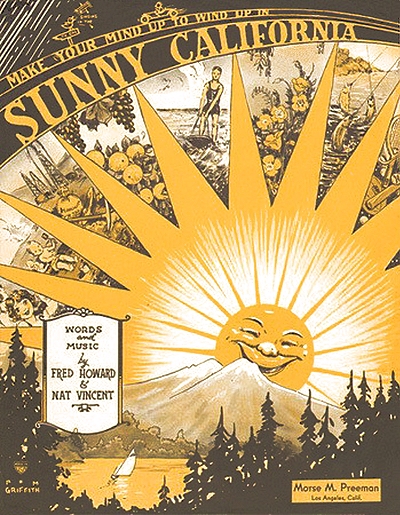 They were about three to four minutes from being ready at the right time, so the announcer asked Nat if he had anything else up his sleeve. Nat made a few scribbles and improvised the rest as he extemporaneously composed and performed the silly song You Can't Fool and Old Hoss-Fly. The following morning, he was at Harry Von Tilzer's office and noted that they were "tearing the place apart," looking for a piece of music that had been requested by Victor Records in Camden, New Jersey. Singers Gus Van and Joe Schenck wanted it for their act and to record it. Turns out that it was the Hoss Fly piece, which he had in his pocket. They made the record and Nat had another minor hit on his hands.
They were about three to four minutes from being ready at the right time, so the announcer asked Nat if he had anything else up his sleeve. Nat made a few scribbles and improvised the rest as he extemporaneously composed and performed the silly song You Can't Fool and Old Hoss-Fly. The following morning, he was at Harry Von Tilzer's office and noted that they were "tearing the place apart," looking for a piece of music that had been requested by Victor Records in Camden, New Jersey. Singers Gus Van and Joe Schenck wanted it for their act and to record it. Turns out that it was the Hoss Fly piece, which he had in his pocket. They made the record and Nat had another minor hit on his hands.
 They were about three to four minutes from being ready at the right time, so the announcer asked Nat if he had anything else up his sleeve. Nat made a few scribbles and improvised the rest as he extemporaneously composed and performed the silly song You Can't Fool and Old Hoss-Fly. The following morning, he was at Harry Von Tilzer's office and noted that they were "tearing the place apart," looking for a piece of music that had been requested by Victor Records in Camden, New Jersey. Singers Gus Van and Joe Schenck wanted it for their act and to record it. Turns out that it was the Hoss Fly piece, which he had in his pocket. They made the record and Nat had another minor hit on his hands.
They were about three to four minutes from being ready at the right time, so the announcer asked Nat if he had anything else up his sleeve. Nat made a few scribbles and improvised the rest as he extemporaneously composed and performed the silly song You Can't Fool and Old Hoss-Fly. The following morning, he was at Harry Von Tilzer's office and noted that they were "tearing the place apart," looking for a piece of music that had been requested by Victor Records in Camden, New Jersey. Singers Gus Van and Joe Schenck wanted it for their act and to record it. Turns out that it was the Hoss Fly piece, which he had in his pocket. They made the record and Nat had another minor hit on his hands.The now somewhat famous vaudeville couple of Franklyn and Vincent continued their touring on the Keith-Albee circuit throughout 1924, and even managed to squeak out a few more songs that year. At one point, Nat said that he was "busier than a hen on a griddle, taking on some production duties in mid-1925, including creation and ownership of a couple of tab properties (shortened tabloid versions of popular music comedies), and trying to find quality time with Blanche that summer as well. Their act, now called A Night on Broadway, continued to tour the country into late 1925. By this time, Nat's formerly semi-prolific song output had totally ceased. Their act continued with only minor changes through 1926 and into 1927, playing smaller venues as films became more popular than vaudeville. There was a cryptic mention of him in The Billboard in December of 1927 stating that he was publishing music in Oakland, California, but any evidence to support that contention was not located. Mentions of him in 1928 appeared to all but cease.
The demands of life on the road, or in the theater in general, often put a strain on show business relationships, and Nat and Blanche were no exception in this regard. The addition of talkies or sound films into the mix, which supplanted the need for live vaudeville for all but the greatest acts, was of no comfort either. By mid-1927 it appears that Nat and Blanche were no more. As he related in 1975, they were in San Francisco at the time and Blanche wanted to go back to Astoria, Long Island, New York to take care of her aging mother. Nat wasn't going to budge on staying west, so Blanche returned east, bought a nice home for herself and her mother, and divorced Nat. Nat then got a job as the publicity director of the Pantages Theater in San Francisco, and also wrote a revue for him during his tenure. He also managed an all-night joint called The Radio Club for nearly 18 months. The next mention in the press of Nat was in 1929, which once again found him in a precarious romantic situation, as detailed in a widely syndicated column, relayed here from the Philadelphia Inquirer of July 7, 1929.
It noted that Nat had created a radio feature called "The Happy Chappies," and was the musical director of a San Francisco night club. Not only that, he was known to be constantly in the company of French radio singer and entertainer Germaine Desmars, whom he had wooed through his music. They were soon set to be wed.
The engagement of two months was climaxed by a visit with Germaine and Nat paid to the San Francisco City Hall, where they applied for a marriage license. Germaine blushed; Nat's chest swelled imperceptibly. That same day—vows Mlle. Desmars—Vincent produced from an inside pocket a ravishing wedding ring. She testified to reporters that the gift sent her into rhapsodic bliss…
For two whole days rhapsody continued to hold sway. Then a most unaccountable thing happened. Vincent appeared at the Desmars home and demanded to see Germaine. When she came out to greet him in that traditional state of pleasurable flutter popularly associated with the soon-to-be-wedded, she found her fiancé regretful, but firm. Politely he told her that the marriage was off… Nat added to her woebegone perplexity by candidly declaring he still loved her. But marriage he regarded as impossible. A flash of Continental inspiration hit Germaine. "Nathaniel," she asked him, "Is it possible you are giving me up for another?"
The potential bridegroom sighed and nodded a yes. "I'm crazy about you, Germaine," he affirmed, "But I can't go through with this wedding." … A day passed and a bombshell arrived. It took the form of the announcement of the filing of a $25,000 breach of promise suit by an attorney… on behalf of his client, Mlle. Desmars.
In the face of the suit and the teeth of the photographs [of herself with Nat], Nat Vincent remained calm. "I am through," was his terse method of dismissing Germaine from his mind. He seemed reconciled to the bursting of romance's bubble.
In the end the suit was either dismissed or settled out of court. The mystery woman turned out to be Nat's eventual third wife, 22-year-old Dolores Nadine Barnes. They were married before 1929 was out. The 1930 census showed the couple living in Los Angeles, likely Beverly Hills, with Nat working as a free-lance songwriter. Not only was his dismissal of Germaine a big change in direction for the composer, but so was his new choice of locale and preferred song genre, which was in line with The Happy Chappies. Nat was now a fan and purveyor—nay, creator—of Western Cowboy music.
Redefining a Genre
FRED HOWARD and NAT VINCENT, writers of I'm Forever Blowing Bubbles, are enjoying an immense success with a new ditty, The Bloom Is on the Sage. They are planning on opening their own publishing office in the near future.
So it was noted in The Billboard of June 21, 1930, albeit crediting Howard with a piece that even Vincent had little to do with. Nat was now firmly ensconced in Los Angeles, enjoying a home in the luxurious subdivision of Beverly Hills. After a six year absence from any new copyrights, he became associated with lyricist Fred Howard Wright (9/30/1896-7/17/1990),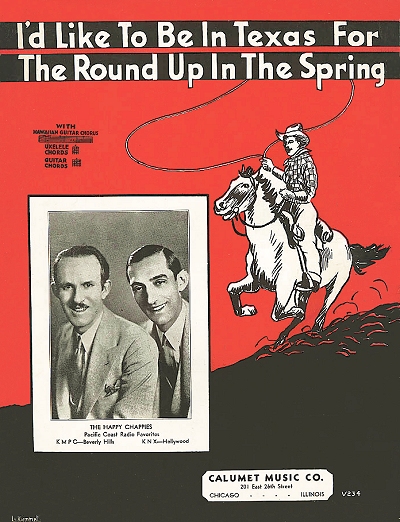 a native of San Diego, California. Another veteran of vaudeville, Wright, who professionally went by Fred Howard, had enjoyed more exposure to early cowboy and western music styles than Nat. However, the latter quickly acclimated to the genre. As it turns out, Nat had already been working in this direction since 1926, having performed around the west coast with lead singer Harry Morton baritone Don Wilson as the Piggly Wiggly Trio. They had found some success in clubs and on the airwaves in San Francisco, but when Wilson left, they reformed as "The Happy Chappies," broadcast on KRFC. The catalyst for the move was an offer from Earl C. Anthony of KFI, who offered the boys a lucrative contract to relocate for the Saturday Night Jamboree radio show. It didn't hurt that there were increased opportunities provided by the recording and movie industries there. In any event, Morton stayed behind, and Nat went down with Fred Howard, with whom he had been working for a short while. Together they became a new version of "The Happy Chappies," mostly performing for radio and a few records.
a native of San Diego, California. Another veteran of vaudeville, Wright, who professionally went by Fred Howard, had enjoyed more exposure to early cowboy and western music styles than Nat. However, the latter quickly acclimated to the genre. As it turns out, Nat had already been working in this direction since 1926, having performed around the west coast with lead singer Harry Morton baritone Don Wilson as the Piggly Wiggly Trio. They had found some success in clubs and on the airwaves in San Francisco, but when Wilson left, they reformed as "The Happy Chappies," broadcast on KRFC. The catalyst for the move was an offer from Earl C. Anthony of KFI, who offered the boys a lucrative contract to relocate for the Saturday Night Jamboree radio show. It didn't hurt that there were increased opportunities provided by the recording and movie industries there. In any event, Morton stayed behind, and Nat went down with Fred Howard, with whom he had been working for a short while. Together they became a new version of "The Happy Chappies," mostly performing for radio and a few records.
 a native of San Diego, California. Another veteran of vaudeville, Wright, who professionally went by Fred Howard, had enjoyed more exposure to early cowboy and western music styles than Nat. However, the latter quickly acclimated to the genre. As it turns out, Nat had already been working in this direction since 1926, having performed around the west coast with lead singer Harry Morton baritone Don Wilson as the Piggly Wiggly Trio. They had found some success in clubs and on the airwaves in San Francisco, but when Wilson left, they reformed as "The Happy Chappies," broadcast on KRFC. The catalyst for the move was an offer from Earl C. Anthony of KFI, who offered the boys a lucrative contract to relocate for the Saturday Night Jamboree radio show. It didn't hurt that there were increased opportunities provided by the recording and movie industries there. In any event, Morton stayed behind, and Nat went down with Fred Howard, with whom he had been working for a short while. Together they became a new version of "The Happy Chappies," mostly performing for radio and a few records.
a native of San Diego, California. Another veteran of vaudeville, Wright, who professionally went by Fred Howard, had enjoyed more exposure to early cowboy and western music styles than Nat. However, the latter quickly acclimated to the genre. As it turns out, Nat had already been working in this direction since 1926, having performed around the west coast with lead singer Harry Morton baritone Don Wilson as the Piggly Wiggly Trio. They had found some success in clubs and on the airwaves in San Francisco, but when Wilson left, they reformed as "The Happy Chappies," broadcast on KRFC. The catalyst for the move was an offer from Earl C. Anthony of KFI, who offered the boys a lucrative contract to relocate for the Saturday Night Jamboree radio show. It didn't hurt that there were increased opportunities provided by the recording and movie industries there. In any event, Morton stayed behind, and Nat went down with Fred Howard, with whom he had been working for a short while. Together they became a new version of "The Happy Chappies," mostly performing for radio and a few records.As for his interest in the genre, in 1975 Nat noted that he and Fred went down to play the Majestic Theater down in Dallas, Texas. While there, they were taken down to a roundup around Temple, Texas, and experienced coffee from a can and food from a chuckwagon. On the way back they were told, "Right over the rise of that hill over there, we want you to talk up and look at it" The purple and yellow sage and wildflowers were in bloom, and that put the idea in Nat's head for what became the song When the Bloom is On the Sage. After having written a few similar pieces, over a period of nine months from 1930 into 1931 they managed to cut ten sides for Columbia Records, of which When the Bloom is on the Sage became a relatively big hit, and was even used as a radio show theme within a few years.
It was one song in particular that helped to redefine the cowboy ballad. The Strawberry Roan had been written around 1914 by singer Curley Fletcher, and a rudimentary score of it had been printed in 1915 as The Outlaw Bronco. It was a seemingly endless waltz ballad about a cowboy trying to tame a particularly feisty red roan horse, and reckoning with the unfortunate results of his efforts. A couple of printings of the original and revised text were issued in the interim. However, the song lacked cohesion and a chorus. Vincent and Howard adopted it and reworked the chorus, plus added a bridge. While Fletcher, the original author, was glad to see renewed interest in the piece which he sold to them for $200, and even asked the duo to help him promote it in 1931, he was duly displeased with their alterations, and within a few years disavowed their work, even writing a series of bawdy verses to the piece that cowboys would be more likely to want to hear. It was also recorded by the original Beverly Hill Billies in December of 1930.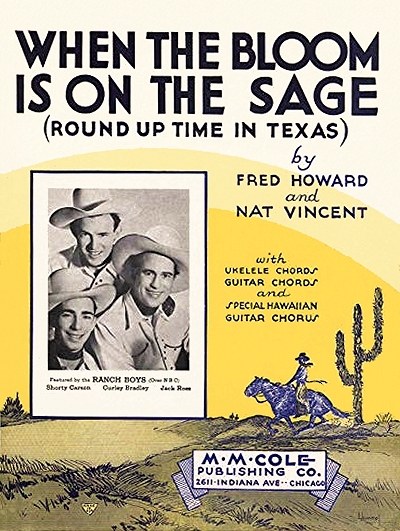 However, there were a number of copyright and ownership disputes over the piece which lasted nearly two decades. Ultimately Strawberry Roan as formalized by Nat and Fred was used in two films, including one with cowboy singer Gene Autry. The origin and "proper" version of the piece are still disputed a century later. It is unclear if it was ever performed by The Happy Chappies, but they did not record it.
However, there were a number of copyright and ownership disputes over the piece which lasted nearly two decades. Ultimately Strawberry Roan as formalized by Nat and Fred was used in two films, including one with cowboy singer Gene Autry. The origin and "proper" version of the piece are still disputed a century later. It is unclear if it was ever performed by The Happy Chappies, but they did not record it.
 However, there were a number of copyright and ownership disputes over the piece which lasted nearly two decades. Ultimately Strawberry Roan as formalized by Nat and Fred was used in two films, including one with cowboy singer Gene Autry. The origin and "proper" version of the piece are still disputed a century later. It is unclear if it was ever performed by The Happy Chappies, but they did not record it.
However, there were a number of copyright and ownership disputes over the piece which lasted nearly two decades. Ultimately Strawberry Roan as formalized by Nat and Fred was used in two films, including one with cowboy singer Gene Autry. The origin and "proper" version of the piece are still disputed a century later. It is unclear if it was ever performed by The Happy Chappies, but they did not record it.As a performing group, the Happy Chappies were not really cowboy material as much as they were a couple of old vaudeville pros who knew how to put over a tune. However, their songs were picked up by many of the famed cowboy singers and western groups of the early 1930s, so they stayed largely in that lane as writers while stretching a bit as performers. Popular in Los Angeles on both KMPC and KNX radio, Vincent and Howard had accumulated enough related material by 1935 that the released a folio, The Happy Chappies Greatest Collection of Outdoor Songs, which saw a large distribution from the Sears department store. In 1975 Nat claimed that he had done the lion's share of the composing, but that he didn't mind sharing the credit. Vincent and Howard apparently never opened their joint publishing enterprise, but they had little issue with finding publishers who would distribute their works. Nat also teamed up with a few other writers in the late 1930s and into the 1940s. With Milo Sweet he had a big hit in 1940 with I'm Gonna Have a Cowboy Weddin' When the Sage is All Abloom, made famous in 1941 by singer Patsy Montana.
Nat had also been on the road a bit over the prior decade. He and Dolores were divorced in either 1931 or 1932, and he was subsequently married to Charlotte Y. Sinclair, a 27-year-old divorced actress from Arkansas. The timeline gets a bit sticky here because within months, he was supposedly married once again to Ekko Carola Wieland Keith Groynne (b.1909) of New Jersey (sometimes seen as Ecco), who had also recently been widowed and then divorced. Evidence of this marriage was difficult to come by, and it may have been one of convenience. However, in 1975 Nat did refer to her briefly as his wife, and her name crept into his professional work in the early 1940s. On May 15, 1933, Ekko gave birth to Faith Alice Christine "Chris" in Maryland. Also, the 1940 census noted that Nat's residence in 1935 was Des Moines, Idaho, which was a temporary situation while he was doing an extended radio gig on "the Iowa Network" as he called it. According to Nat's memories in 1975 concerning a certain radio personality in Des Moines:
He [Ronald Reagan] was a little announcer at Drake University… We went to the same tailor together and had our clothes made, see. When they had basketball down at Drake University, they sent for me to sing at halftime. So I know him as "Dutch" Reagan, see. When I got back to California and he was governor [1967-1975], I knew where he lived and I got his address on Palisades. I wrote him a letter and I said, "Dear Dutch, Glad to see you made it. I used to listen to you with the [author] Zane Grey thing, you know, the Twenty Mule Team Borax and all the announcing." Then he was married to Jane Wyman and divorced her, and she put him in show business.
Nat was back in Los Angeles before 1937. The 1940 enumeration also showed that he and Ekko, who indicated she and Chris were in New York City in 1935, were divorced by that time.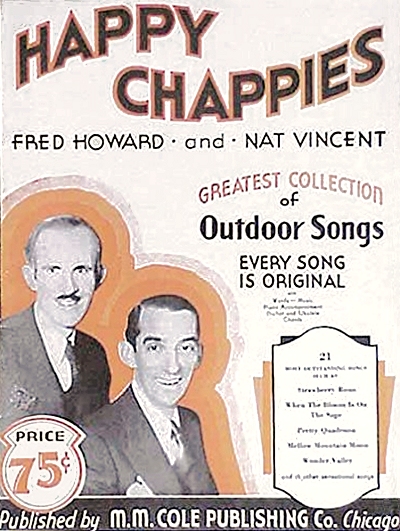 Content from the 1975 interview suggests that Ekko was an alcoholic, a notion reinforced by comments from Chris. She was residing near downtown Los Angeles that year with their daughter. Chris came to live with Nat shortly after that time and she lived both with and, while briefly married, near him for the rest of his life. After having made a go of it four (perhaps five) times, Nat would not marry again.
Content from the 1975 interview suggests that Ekko was an alcoholic, a notion reinforced by comments from Chris. She was residing near downtown Los Angeles that year with their daughter. Chris came to live with Nat shortly after that time and she lived both with and, while briefly married, near him for the rest of his life. After having made a go of it four (perhaps five) times, Nat would not marry again.
 Content from the 1975 interview suggests that Ekko was an alcoholic, a notion reinforced by comments from Chris. She was residing near downtown Los Angeles that year with their daughter. Chris came to live with Nat shortly after that time and she lived both with and, while briefly married, near him for the rest of his life. After having made a go of it four (perhaps five) times, Nat would not marry again.
Content from the 1975 interview suggests that Ekko was an alcoholic, a notion reinforced by comments from Chris. She was residing near downtown Los Angeles that year with their daughter. Chris came to live with Nat shortly after that time and she lived both with and, while briefly married, near him for the rest of his life. After having made a go of it four (perhaps five) times, Nat would not marry again.Now in his fifties, Nat had been limiting his writing activities since the mid-1930s, focusing on performing, and in some cases managing artists. Around 1936 to 1937 he became involved with Ralph S. Peer who had acquired a number of music catalogs and had offices in several countries, but was not certain how to manage all that he had. As it turned out, according to the 1975 interview, he and Nat were born just five blocks from each other in Kansas City, and Nat's grandparents and Peer's family had known each other even before the two were born. They were even christened by the same minister. So, Peer's grandmother had suggested to Ralph that he and Nat collaborate. He would ultimately spend 22 years working for Peer's Southern Music branch in Hollywood into the early 1960s, albeit with a few hitches along the way, which will be noted. According to Nat in 1975, Peer made it clear to Capitol Records among other organizations that Vincent was fully in charge of that branch, and what he said goes. Nat also noted that for a while he nearly forgot he was a songwriter. However, the job allowed him a continuing salary and association with many fine artists.
Nat's work during the Second World War did not often make it into the news. However, there was a surge of activity from late 1944 into 1945 that was revealed by copyright records. Apparently, Nat decided to venture into the somewhat sketchy world of song-poem publishing, which had a notorious history. Song-poem publishers of the 1900s and 1910s would put out advertisements for fledgling artists to contribute their work - either lyrics or music - and have them typeset, and in some cases printed in a volume of 100 to 500 copies, then sent back for the original composer or lyricist to distribute, all at their expense. Historically this often meant a great deal of expense and heartbreak on one side, and a lucrative profit on the other. Nat put out a similar call for poems or lyrics, probably at a minimal charge, but evidently, he only provided music for them and sent back either a manuscript or a simple printed copy. Over 350 such items were located in 1944 and 1945 copyright records, a large number of them with war-themed titles, and almost all of them registered as unpublished to the originator rather than to Nat. Why he made this move is unclear, but judging by the sheer volume of what he completed (and a number of "interesting" titles as well), it becomes clear why he backed out of the project by late summer of 1945, when the war ended. (Note that these songs are not listed here due to the overwhelming number of unpublished entries).
The Last Years of "Bubbles"
The reason is unclear, but on a handful of numbers composed by Howard and Vincent, including the 1932 work The Little Girl Dressed in Blue, they used the cumulative pseudonym of F.N. Vinard (Frank Nat VINcent/howARD). As early as 1942, and especially during 1946 after his song-poem experience, Nat was at it again, this time issuing several works under the pseudonym of Ekko Whelan, a derivative of his last wife's maiden name. This was due to contract issues with Peer and Nat's association with other publishers, all of which may call unwanted attention to the popular manager of Southern Music. So in order to placate other publishers and his boss, Nat had to hide his identity behind the nom de plumes. Some of his pieces had covered on records and radio broadcasts for a decade or more by cowboy songsters Gene Autry,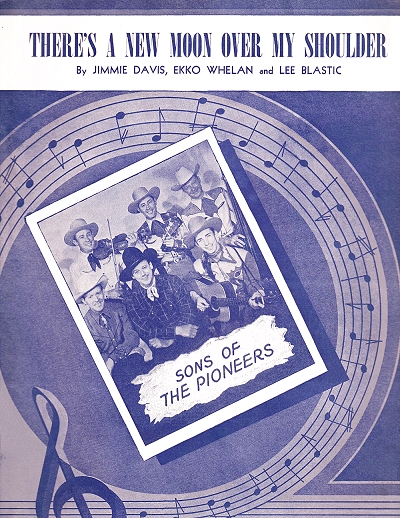 Roy Rogers (a.k.a. Leonard Slye), the Golden West Boys, the Blue Boys Trio and the Sons of the Pioneers. Nat also wrote one work with Autry that in 1946, the minor hit There's Happiness Again on the Range. In 1948, Nat took on management for singer Tommy Duncan, who had previously spent 16 years with the Bob Wills organization, and represented him in his relationship with Capitol Records. Duncan had quit Wills' band because the leader had issues with alcohol and was frequently missing dates, which meant the band made less at events where Wills was not present. Duncan was ultimately dissatisfied with the slow pace of recording to release at Capitol, and soon abandoned both the company and Nat.
Roy Rogers (a.k.a. Leonard Slye), the Golden West Boys, the Blue Boys Trio and the Sons of the Pioneers. Nat also wrote one work with Autry that in 1946, the minor hit There's Happiness Again on the Range. In 1948, Nat took on management for singer Tommy Duncan, who had previously spent 16 years with the Bob Wills organization, and represented him in his relationship with Capitol Records. Duncan had quit Wills' band because the leader had issues with alcohol and was frequently missing dates, which meant the band made less at events where Wills was not present. Duncan was ultimately dissatisfied with the slow pace of recording to release at Capitol, and soon abandoned both the company and Nat.
 Roy Rogers (a.k.a. Leonard Slye), the Golden West Boys, the Blue Boys Trio and the Sons of the Pioneers. Nat also wrote one work with Autry that in 1946, the minor hit There's Happiness Again on the Range. In 1948, Nat took on management for singer Tommy Duncan, who had previously spent 16 years with the Bob Wills organization, and represented him in his relationship with Capitol Records. Duncan had quit Wills' band because the leader had issues with alcohol and was frequently missing dates, which meant the band made less at events where Wills was not present. Duncan was ultimately dissatisfied with the slow pace of recording to release at Capitol, and soon abandoned both the company and Nat.
Roy Rogers (a.k.a. Leonard Slye), the Golden West Boys, the Blue Boys Trio and the Sons of the Pioneers. Nat also wrote one work with Autry that in 1946, the minor hit There's Happiness Again on the Range. In 1948, Nat took on management for singer Tommy Duncan, who had previously spent 16 years with the Bob Wills organization, and represented him in his relationship with Capitol Records. Duncan had quit Wills' band because the leader had issues with alcohol and was frequently missing dates, which meant the band made less at events where Wills was not present. Duncan was ultimately dissatisfied with the slow pace of recording to release at Capitol, and soon abandoned both the company and Nat.There was another brief surge of country and western compositions by Vincent issued in 1949, and possibly more using pseudonyms or working as a ghost writer or arranger. Then, for the most part, at age 60, Nat all but retired from composition and public performance, with only scant offerings by request or on a whim through the mid-1960s. The 1950 census, taken in Burbank, California, listed him as merely a contact man for a music publisher, rather than directly as a composer. Nat became a charter member of the Country Music Association in Nashville, Tennessee, in 1958. Part of his time representing Peer and Southern Music was spent in Nashville, Tennessee, from 1960-1961, where he represented the catalogs of many country and western composers and performers, mostly working with Capitol Records when he was there and back in Los Angeles.
The overall nature of Nat's work during his period with Peer and Southern Music was to not only try to place songs from their catalog with recording musicians and record companies, but to wine and dine the musicians and producers, sometimes clean up their messes, and, of course, attend the recording sessions. In 1975 he noted many of the peculiarities of certain artists, some of which would not record unless there was alcohol available, some of whom were always out of funds and needed a bit of a boost. While his base was in Hollywood, Nat would often have to travel to Northern California, Texas, Chicago, New York City or Nashville to oversee the recording or broadcast of certain songs, including many of his own. He would even show up at recording sessions with songs in hand, hoping for a last-minute sale when the artist and their band tried it out. This level of work took its physical toll after many years, but Nat still considered himself active in the business at age 85.
Bubbles, as Nat became known, due to his involvement in that one big hit, lost the majority of vision due to glaucoma and cataract issues during the 1960s, rendering him legally blind. Following her divorce from Larry Wilson, from the mid-1960s to Nat's death, his daughter Chris would act as his caretaker in his La Crescenta, California home just east of the San Fernando Valley, where they had been residing since the late 1940s. During that period, he got to experience two different ragtime revivals in which some of his work was once again recorded and heard by a new generation, as well as a milder resurgence of Western music at chuckwagon style dinner event centers that popped up around the western states. Overall, he claimed to have co-authored at least 1721 songs. In 1975, Nat gave an extensive four-and-a-half-hour interview outlining his life and including performances of some of his songs, even a few recently composed (but not copyrighted under his name) while he was in his mid-eighties. After singing some of them he noted that he was going to give sixteen such songs to another artist and just let him take the credit for them. It is currently held at the Country Music Hall of Fame in Nashville, Tennessee, and was used to inform part of this essay. As for his quality of life at that time, Nat clearly stated "While I'm blind, I have no qualms about it being a hindrance in any way I sing and play and enjoy life. I eat and I thank my maker above that I'm here as long as I am, eight-five years and four months." Nathaniel David "Bubbles" Vincent passed on in 1979 at 89 years. He will forever be blowing bubbles of happiness through the music he left behind, appealing to multiple walks of life.
Researcher Ramona Baker suggested this entry, and rightfully so, as there was very little of note available on Vincent. The majority of the information came from public records and copious newspaper articles, with some derived from recording logs and sheet music copyrights.

 Known Compositions
Known Compositions